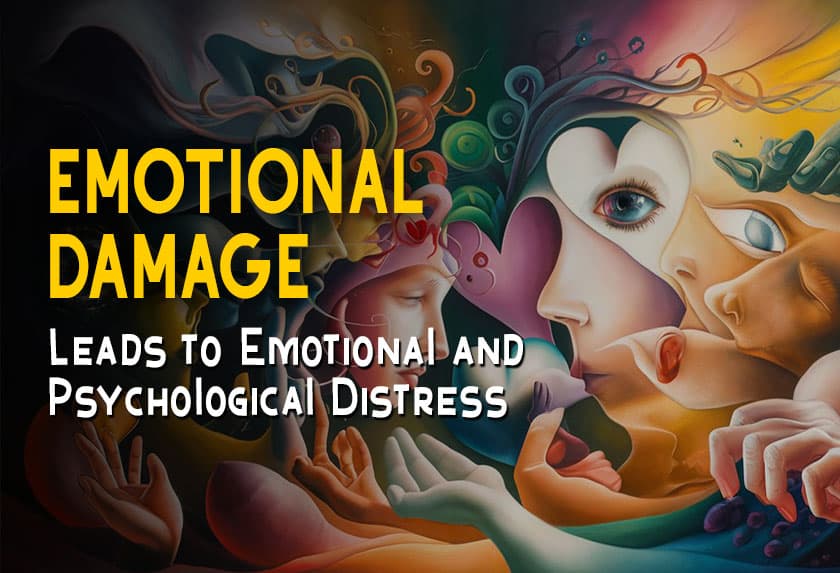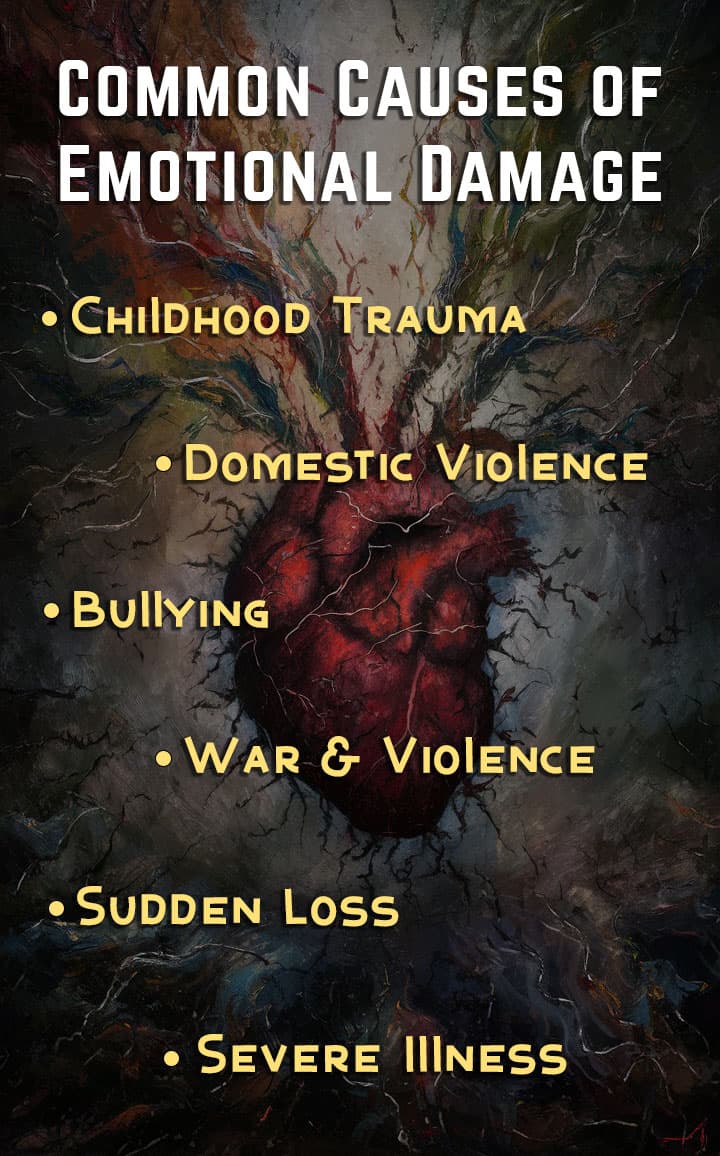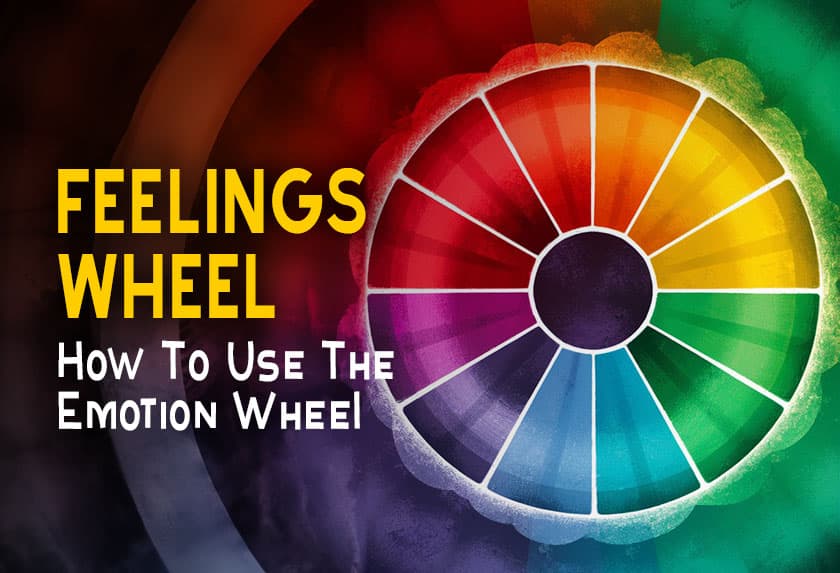Emotional damage refers to psychological or emotional harm caused by traumatic memories and experiences or continued exposure to negative events over time.
It can deeply impact mental health and relationships in negative ways.
Common Causes of Emotional Damage
Many different events can lead to emotional damage, including:
- Childhood Trauma: Emotional abuse, neglect, loss of a parent, or other trauma during childhood can profoundly impact emotional development. Neurological and cognitive changes may even occur in how emotions are processed and regulated. Children lacking nurturing caregivers often struggle to form secure attachments later on.
- Domestic Violence: Ongoing domestic abuse and physical harm frequently undermines a sense of safety and self-worth. The constant fear, anxiety, and feeling of powerlessness can cause lasting emotional distress long after the relationship ends.
- Bullying: Persistent bullying, whether verbal, physical, or online, can lead to withdrawal, loneliness, and belief that one deserves mistreatment from others. The inability to escape this hostile environment compounds emotional distress.
- Severe Illness & Accidents: Serious illnesses and injuries that cause disability or pain can understandably lead to grief, depression, post-traumatic stress, and other struggles – especially without adequate support. Near death experiences may also lead to emotional trauma.
- War & Violence: The extreme stress of combat, exposure to human cruelty, and traumatic loss of fellow soldiers negatively impacts veterans and civilians from conflict zones. The severity of emotional distress relates to trauma intensity.
- Sudden Loss: The unexpected death of a loved one short circuits the grief process. Guilt, denial, despair, and the pain of adjusting to a radically changed life contribute to emotional damage after sudden loss.
In many cases emotional distress stems from continued exposure to stress, fear, abandonment, or other destructive experiences without adequate nurturing support and can cause post-traumatic stress disorder.
It can have profound impacts on personality, relationships, and one’s view of themselves and the world.
Signs of Emotional Distress
Those suffering from emotional distress may display:
- Difficulty Regulating Emotions: Rage, panic, sadness, or numbness may arise suddenly and intensely in response to triggers most would find only mildly upsetting. They struggle with mood swings and moderating these feelings.
- Stunted Emotional Growth: Inabilities forming close bonds, empathizing, or understanding nuanced emotions may reflect stunted growth from early childhood trauma. Their emotional skills remain childlike and immature.
- Inability Sustaining Relationships: Early attachment disorders and betrayal may make trusting others difficult – leading to isolation or volatile relationships. The inability to be vulnerable and intimate persists.
- Ongoing Mental Health Issues: Clinical anxiety, chronic depression, complex PTSD, dissociative disorders, and personality disorders often accompany deep-rooted emotional distress. Sufficient treatment is critical.
- Low Self-Worth & Destructive Behaviors: They frequently view themselves as irreparably damaged, unlovable, hopeless, and fundamentally flawed. This manifests in self-harm, eating disorders, addiction, risky behaviors, and suicidality.
- Hypervigilance and Distrust: Emotional distress creates a hair-trigger nervous system primed to react to any subtle sign of being devalued, abandoned, or mistreated. New relationships suffer from distrust.
Healing is possible but requires courage, compassion, and entering deeply painful places internally along with professional treatment.
Healing from Emotional Damage
Recovery from significant emotional distress requires commitment to a journey of self-discovery, meaning-making, and gradually replacing destructive patterns with healthy coping.
Important elements include:
- Establishing Safety and Stability First: Until basic security, predictability, and resources for managing daily life are in place, focusing solely on processing trauma proves to be unproductive. Prioritizing self-care and life functioning paves the way for trauma treatment.
- Trauma Recovery with Professional Help: Collaborating with a licensed trauma-focused therapist using evidence-based treatment equips clients to slowly approach traumatizing events when sufficient inner resources develop. This prevents re-traumatization which exacerbated damage. Therapists help manage distress and make meaning from suffering.
- Learning Coping Strategies: Clients experiment with methods like meditation, mindfulness, journaling, sensory-grounding techniques, and accessing social support to better regulate emotions between sessions. This expands their window of stress tolerance.
- Fostering Compassionate Self-Talk: Counteracting self-criticism and blame by cultivating gentleness and understanding for oneself and one’s needs is central to healing emotional wounds. Affirmations of self-worth can sink in deeply over time.
- Forming Healthy Relationships: Relating to safe, nurturing people allows for corrective emotional experiences. Therapy aids in identifying trustworthy individuals so that social needs are increasingly met in positive ways – instead of through substance abuse, idealization, and other means.
- Making Meaning from Suffering: As survivors share their stories and receive psychological and emotional support from others, they often begin viewing themselves as capable of surviving and rising above their unjust losses and traumas by integrating those painful chapters into a broader life narrative.
The path towards healing looks different for everyone depending on a person’s distinct experiences and needs.
But with compassion, courage, resilience, and help, people can recover and overcome early physical and emotional wounds to find hope, purpose, and a truer self.
Supporting Those with Emotional Damage
If you suspect someone close suffers from emotional distress consider:
- Listening Without Judgment: Allow them to share feelings and experiences openly without criticism, even if you cannot relate personally.
- Validating Their Experience Gently: Do not argue about whether emotions seem logical or if traumatic events occurred “enough” to warrant feeling damaged. Honor their inner world.
- Normalizing Seeking Professional Help: Destigmatize mental healthcare. Trauma therapy proves necessary, not weak. Offer to help locate affordable options if cost concerns arise.
- Setting Firm Boundaries If Needed: You cannot fix others’ complex trauma. Limit destructive behaviors’ impacts on your life when necessary while still extending compassion from a distance.
- Offering Consistency and Support: Follow through reliably without conditional affection based on their functioning. Help reduce instability when you consistently show up patiently.
Healing emotional damage requires unconditional understanding from others. Avoid condemning, lecturing or abandoning loved ones with psychological issues.
Instead compassionately guide them towards mental health professionals trained in evidence based trauma treatment.
With time, safety, and care those overcoming emotional wounds often describe feeling emotionally “unshackled.”
Growth occurs slowly but can profoundly shape trauma survivors’ lives and relationships.
FAQs
What does emotional damage mean?
Emotional distress refers to psychological, emotional, or mental harm caused by very stressful, frightening, or disturbing life events, especially trauma experienced as a child or prolonged repeatedly over months or years. This can deeply impact someone’s mental health and ability to relate to others.
What is an example of emotional damage?
A child neglected or abused by parents during crucial developmental years may struggle to form secure relationships due to emotional damage from absent or hurtful caregivers during their youth. Veterans exposed to the horrors of war may return with debilitating symptoms of post-traumatic stress from emotional trauma.
What causes emotional damage?
Many things can cause emotional damage, but most often it results from traumatic experiences – especially those that occur early in life or from consistent, relentless stressors like domestic violence. The betrayal, loss, cruelty, instability, or deprivation sinks deeply into a person’s psyche in lasting, damaging ways if not addressed and healed.
Is emotional damage permanent?
No, emotional distress does not have to be permanent, but it requires active effort to heal. With professional treatment such as trauma-focused therapy, over time people can recover, even when it stems from severe early childhood trauma. By processing painful memories safely and learning coping strategies, trauma survivors can overcome early emotional wounds. However, without any intervention, the effects left unaddressed can persist and negatively impact mental health and relationships long-term. The good news is emotional wounds need not define one’s life forever with the right support. Emotional distress can be overcome, though the journey is often gradual, demanding courage and vulnerability.
















